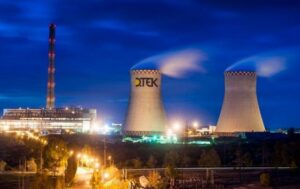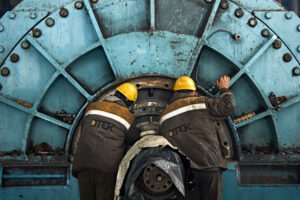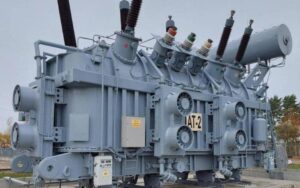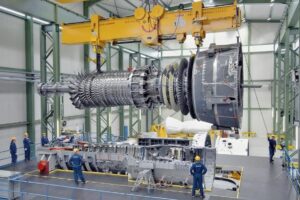
In January-April 2025, DTEK Energy allocated approximately UAH 1.6 billion to repair and restore thermal power plants damaged by massive enemy shelling.
According to a press release from the energy holding company, the repair campaign is currently continuing without interruption, as the scale of the damage remains critical. A year ago, 90% of DTEK Energy’s generating capacity was destroyed or seriously damaged by attacks. On the eve of last winter, energy companies managed to restore more than half of it, but new strikes in November-December again caused serious damage.
“Our main task is not to stop. We are working every day on restoration to ensure the stable operation of the power system in the summer, during peak loads, and to confidently enter the next heating season,” said DTEK Energy CEO Alexander Fomenko.
In 2024, DTEK invested UAH 3.6 billion in the restoration of thermal power plants and another UAH 7.5 billion in the development of domestic coal mining.
Over the past year, Russia has carried out 13 massive attacks on Ukraine’s energy sector, dealing a serious blow to DTEK Energy’s thermal power plants, among others. In total, since the start of the full-scale invasion, the company’s thermal power plants have been attacked by the enemy 205 times. Fifty-six power plant workers were wounded in the attacks and four were killed.
DTEK Energy provides a closed cycle of electricity production from coal. As of January 2022, the company’s installed thermal generation capacity was 13.3 GW. A complete production cycle has been established in coal mining: coal extraction and enrichment, machine building, and maintenance of mining equipment.

In January-March 2025, DTEK Energy invested about UAH 1.2 billion in repairs and restoration of thermal power plants that suffered from massive enemy shelling.
“This is a third of the total investment in the restoration of TPPs over the past year,” the company said in a press release.
DTEK noted that the repair campaign is ongoing as the level of damage caused by the aggressor’s attacks remains extremely high.
As reported, as of the summer of 2024, 90% of the company’s thermal generation was damaged or destroyed. Although the power engineers managed to restore more than half of the capacity on the eve of winter, another massive shelling in November and December caused new serious damage.
“Our main task today is not to stop but to continue the reconstruction work. We are working hard to be ready for the summer peak loads and the upcoming heating season,” said DTEK Energy CEO Oleksandr Fomenko.
In 2024, the energy holding invested UAH 3.6 billion in the restoration of thermal power plants and another UAH 7.5 billion in the development of domestic coal mining.
Last year, the Russian Federation launched 13 massive attacks on the Ukrainian energy sector, dealing a serious blow, in particular, to DTEK Energy’s thermal power plants. In total, since the beginning of the full-scale invasion, the company’s TPPs have been attacked 205 times. As a result of the attacks, 56 power engineers were wounded and four were killed.
“DTEK Energy provides a closed cycle of electricity generation from coal. As of January 2022, the pre-war installed capacity in thermal power generation was 13.3 GW. The company has established a full production cycle in coal mining: coal mining and enrichment, mechanical engineering and maintenance of mine equipment.

The Lithuanian Ministry of Energy intends to ban the use of Chinese software during the construction of solar and wind power plants with a capacity of more than 100 kW, said the head of the department, Dainius Kreivis.
According to him, no such restrictions are planned for low-capacity power plants installed by residents of the country.
“We are preparing documents so that all equipment, even in private investments, that generates more than 100 kW, cannot use any Chinese software,” Kravis told Ziniu radijas radio station on Thursday, answering the question whether Lithuania should abandon Chinese technology in the country’s power system.
“That is what we plan to do. I think the decisions we will make will solve the problem,” the minister said.
The Energy Minister emphasized that government agencies are already prohibited from installing Chinese-made software.
According to Kravis, despite the growing number of household electricity producers, there is currently no threat of “excessive use” of Chinese equipment at their facilities.
President of the Lithuanian Confederation of Industrialists Vidmantas Janulevicius said at a meeting of the Seimas Committee on Economics in late March that Chinese software is often used in the construction of renewable energy facilities both in Lithuania and in the rest of Europe. He suggested looking for funds to replace Chinese technology at existing power plants with Western software.

On May 2, on the sidelines of the Uzbek-German business forum, Siemens Energy signed agreements on two projects with Thermal Power Plants JSC. It is specified that the company will be involved in the implementation of heat and electricity cogeneration technologies in the country.
It is planned to install four energy-efficient gas turbines with a capacity of 54 MW each. Two of them will be placed in the heating boiler house No. 3 in Bukhara and at the Mubarekskaya CHPP.
The plants will generate 1.7 million kWh of electricity and 1.5 Gcal of heat annually. The plants will employ 80 people for their maintenance. The total cost of the projects is EUR 72 million.
In addition, Siemens will build several new power plants.
With its support, it is planned to build a thermal power plant in Surkhandarya and launch it by the end of 2026. The German company will participate in the construction of a thermal power plant in the Navoi chemical cluster, as well as in the creation of wind and solar power plants with a total capacity of 1000 MW.